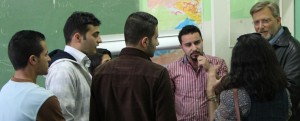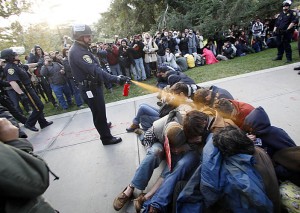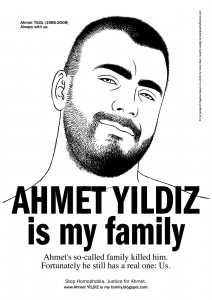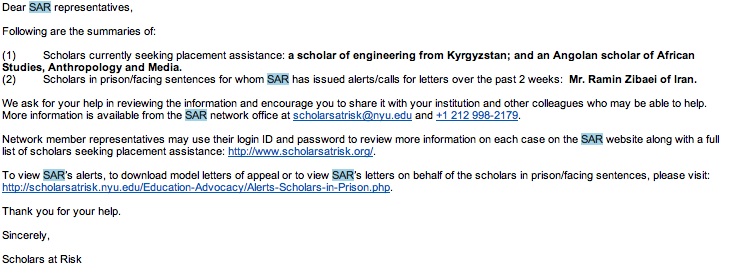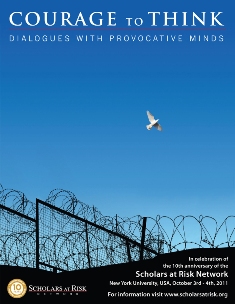As Yoda might say: “Human Rights about Star Wars not”
Sci Fi films and fiction are often a good place to find the kinds of moral conundrums and ethical challenges, which lend themselves to thinking and teaching about Human Rights. But the Lucas/Disney/Abrams Star Wars franchise isn’t. As Yoda might say: “Human Rights about Star Wars not” – nor for that matter is it about democracy, emancipation, ambiguity, science or egalitarianism.
The universe imagined by Lucas, who saw Star Wars as the “hero’s journey,” gives us little in the way of awareness of the human condition, indeed it eschews any celebration of shared humanity and instead embraces the mass killing of combatants, non-combatants and seemingly sentient human-like androids with little sense of loss or accountability.
Intellectually unchallenging, the films lack any sense of moral ambiguity (Light Side, Dark Side) – which has appealed ever-since to men like Dick Cheney, who once remarked “We also have to work, though, sort of the dark side, if you will,” as a defense of torture, which occurred at “dark sites” around the world following the attacks of September 11, 2001.
Moreover, whatever politics there are seem to be dominated by a quasi-hereditary unelected Senate, whose rebellion seems motivated as far as I can tell by concerns over trade routes and the political autonomy of peripheral planets where the grossest of human rights violations are routinely practiced and without comment from that Senate: slavery, human trafficking, genocide and the destruction of indigenous cultures — and that’s just on Tatooine; I hate to think what’s happening on Endor.

Dr. Watenpaugh debates the finer points of Trek vs. Star Wars with his son, Aram, while his daughter, Arda, looks on in appropriate bemusement
Presiding over it all is a zealous Gnostic sect, the leadership of which bases its religious practices on the idolization of the tools of extreme violence (light sabers), the ability to violate the privacy rights of others and enter their minds without permission (Jedi mind tricks) and who view the world through absolutes while claiming only their opponents do so (“Only Sith deals in absolutes.”)
Like in Lord of the Rings, technology is bad and the foot soldiers of the enemy are merely a one-dimensional Other (Orcs and Stormtroopers), whose origins in torture and rights-violations are obscured and whose easy and mass deaths are played for laughs. We learn in the most recent “Star Wars” that Stormtroopers aren’t just clones anymore, but are child soldiers stolen from their families in the vein of Joseph Kony and his ilk.
But isn’t it just a movie? Sure, but “Star Wars” is also a cultural phenomenon that is both a reflection of our zeitgeist and a shaper of it. J.J. Abrams is smart enough to know that and rather than just pandering to aging Fan Boys with call backs to “A New Hope” and bringing us yet another Disney Princess in the form of Daisy Ridley’s Mary Sue Rey, he had a chance to use the films in the best tradition of SciFi to pose some decent questions.
But then again, he made the last two Star Trek films, which didn’t do much of that either.
Still, I enjoy and admire Star Trek for many of the same reasons I find Star Wars so problematic. The anthology science fiction series that came from the imagination of Gene Roddenberry has been around for 50 years and shouldn’t be judged only by the last two movies – which weren’t that bad and even asked decent questions about ethics and rights. Kirk and Spock take seriously the idea of exploration, the role of Starfleet in humanitarian efforts and seek to arrest their enemies for the crime of genocide (the destruction of Vulcan) before joyfully blowing them up.
In fact, for years I’ve led a freshman honors’ seminar on the Human Rights of Star Trek. I even use in my 80+ student Human Rights course the brutal interrogation of Patrick Stewart’s Captain Jean Luc Picard by a Cardassian Gul played by David Warner in the episode “Chain of Command” (“There are four lights!”) to illustrate how little torture is about information and more about power and fear.
Nichelle Nichols (Uhura) who was the first African-American women to play an officer of any kind on a t.v. show always remembered how Roddenberry told her that Trek was about “something.” Sci Fi was a safe space from which to explore the tough issues of the ‘60s, including the Vietnam War — “Private little war” — and race — “Let that be your last battlefield.” In the 90s it covered homosexuality; in the Aughts, anthropogenic climate change.
The fact that Trek was about something has given its actors the kind of post-t.v. platform from which to support the arts and respect for rights and dignity we’ve never seen those of the Star Wars universe even attempt. Being Sulu has given George Takei the credibility and trust of legions of fans that made him not just a gay rights icon, but also a moral leader in the remembrance of Japanese Internment and most recently anti-Muslim and Arab hysteria.
The movies we love and stand in line for tell us a great deal about who and where we are as a people on the critical issues of the moment. I’m not sure that “Star Wars” is where we should be.
